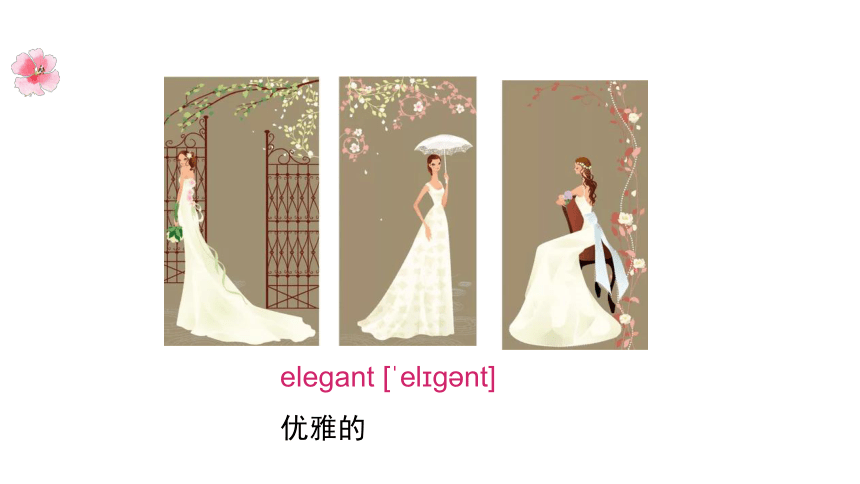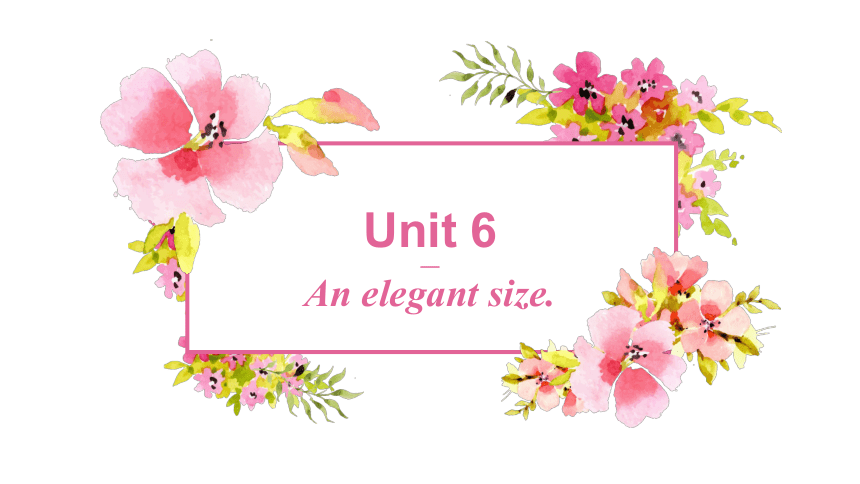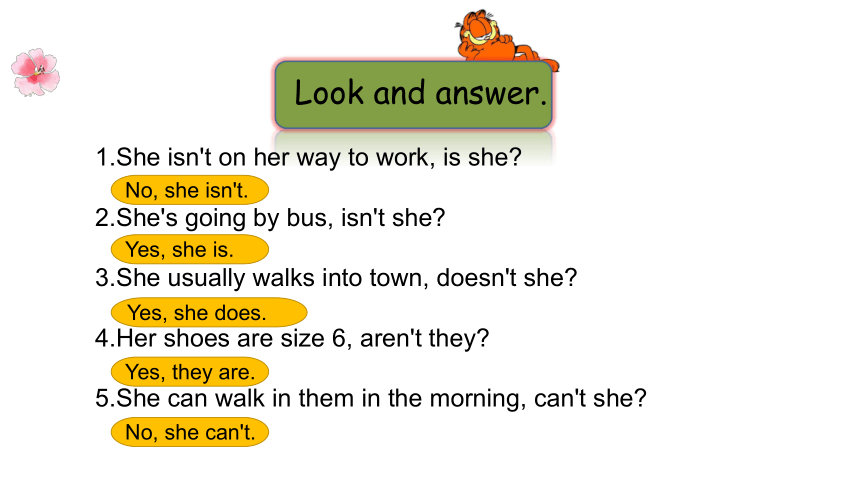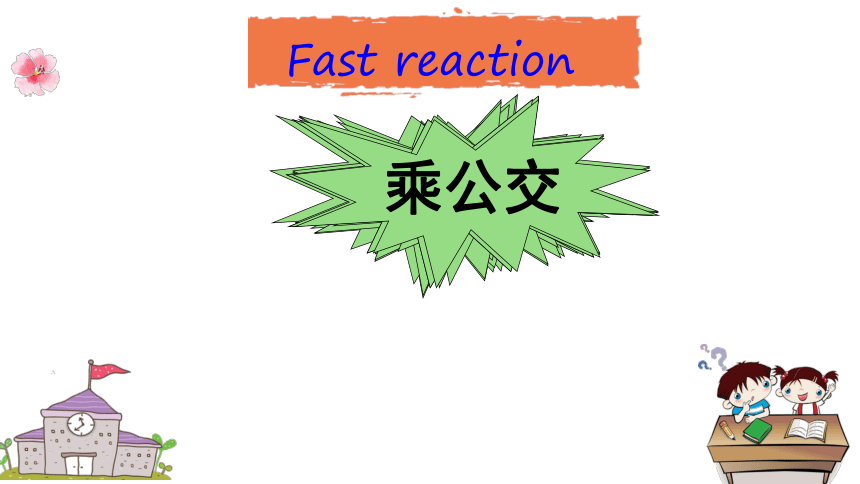新概念英语青少版2A:Unit 6 An elegant size 课件(51张PPT,音视频为嵌入)
文档属性
| 名称 | 新概念英语青少版2A:Unit 6 An elegant size 课件(51张PPT,音视频为嵌入) |  | |
| 格式 | zip | ||
| 文件大小 | 32.3MB | ||
| 资源类型 | 教案 | ||
| 版本资源 | 新概念英语 | ||
| 科目 | 英语 | ||
| 更新时间 | 2019-06-19 10:28:56 | ||
图片预览












文档简介
课件51张PPT。antwebpageplacelook upweeksurvive456123breathestretch78alsoinsectjokeeveningusefunnily
enough12131491011websitewrite1516Little interpreter.1.The webpage is about ants.
2.你为什么正在查找蚂蚁的信息?
3.蚂蚁通常生活在干燥的地方,但能在水中存活两个星期
4.Ants do really interesting things.1232网页是关于蚂蚁的。 Why are you looking up ants?Ants usually live in dry places,
but they can survive under water for two weeks..蚂蚁做的事也很有趣。elegant [?el?ɡ?nt]
优雅的Unit 6 An elegant size.1.Is Annie looking very elegant today?
2.Does she usually drive into town?
3.What size are her feet?
4.Why can't Annie walk in her shoes before lunch?
Yes, she is.No, she doesn't. She usually walk into town.Her feet are size five in the morning, and size six in the afternoon. Her feet are size five before lunch, but her shoes are size six.Look and answer.1.She isn't on her way to work, is she?
2.She's going by bus, isn't she?
3.She usually walks into town, doesn't she?
4.Her shoes are size 6, aren't they?
5.She can walk in them in the morning, can't she?
No, she isn't.Yes, she is.Yes, she does.Yes, they are.No, she can't.intoperfectfootclothesa pair oftheatrewearby bussizeFast reaction走路午餐前优雅的穿上剧院一双衣服穿戴完美的进入尺寸乘公交Listening and understandingPolly : You're looking very elegant today, Annie!
Annie: Yes, I'm on my way to my accountant's. I always put on a nice outfit for him.①elegant [`eliɡ?nt] (人或其举止)优美的, 文雅的; 漂亮的 You're looking very elegant today.现在进行时表示现在时刻的动作或者状态。
She's wearing a blue skirt. 她穿着一件蓝色短裙。
They are playing basketball now. 现在,他们正在打篮球。
Look at the picture. The children are flying kites in the park.
看这幅图。那些孩子正在公园放风筝。on my way to 在我去……的路上
on one’s way home 在某人回家的路上
on my way to school 在我去学校的路上
on his way home 在他回家的路上
She is on her way to school.
He is on his way to New York.accountant's 职业的名词+加's时,表该职业工作地点 accountant’s=accountant’s office
the doctor's 诊所/the barber's 理发店
the teacher's 老师办公室/the chemist's 在药店
the baker's 在蛋糕店 /the butcher's在肉店
at my mother's 在我妈妈家Listening and understanding①Annie : So I'm going by bus.
Polly : What do you mean, Annie?②I'm going by bus. 现在进行时表将来。已经确定或安排好的但不确定会不会发生的将来活动。
I'm leaving for a travel in Nepal next week.(我下周要去尼泊尔旅行)
We're flying to Paris tomorrow.(我们明天乘飞机去巴黎)
What do you mean 你是什么意思 What do you mean, you don't like my cooking?
你是什么意思?你是不喜欢我做的饭?
What do you mean by coming home so late?
你怎么竟敢这么晚才回家?
What does the word mean? 这个单词是什么意思?Listening and understanding③Annie: Well, I usually walk into town.
But today I'm going by bus.
It's my shoes. You see.
Polly : Your shoes?into prep. 进入 Into: 表示进入动作
go into the shop
In:表示在里面的状态
in the shopListening and understandingAnnie : Yes, my shoes.
They are size six.
Polly: They‘re perfect with your outfit.④too adv.也too:用于肯定句和疑问句
I like them, too.
Do you like them, too?
either:用于否定句
I don’t like them, either.Listening and understandingAnnie: But I can't walk in them
in the morning.
They're fine in the afternoon.
Polly: What do you mean?⑤Listening and understanding⑥Annie: My feet are size five in the morning,
and size six in the afternoon.
I can`t walk in these shoes
before lunch.foot 复数 feet
tooth---teeth
goose---geese1.现在进行时和一般现在时
2.短语on my way to, what do you mean, into 1.抄写新单词汉语英语各五遍
2.发语音至少三天。Lesson 2Game timeperfectwearintoclothestheatrea pair ofsizeby bus现在进行时(The Present Continuous Tense)
1.定义
2.结构
3.动词+ing规则变化1.定义①:
--现在进行时态表示现在(说话瞬间)正在进行或发生的动作。定义②:
--现在进行时态还可以表示
当前一段时间内的活动或现阶段
正在进行的动作。We are learning in the school these days .I am reading a book this week.主语+be(am/is/are)+动词现在分词(V-ing) 2.基本结构:肯定式结构:主语+be+动词-ing形式+其他.否定式结构:主语+be+not+动词-ing形式+其他.一般疑问句式结构:Be+主语+动词-ing形式+其他?特殊疑问句式结构:疑问词+be+主语+动词-ing形式+其他?3.现在分词的基本构成①动词原型+ingExample: read--reading , eat--eating
②以e结尾的动词,去e+ing
Example: write--writing, make--making③重读闭音节要双写结尾的辅音字母在+ingExample: put--putting run--running练习:把下列句子变为现在进行时态:We watch TV .
_____________________
2. I look at the blackboard.
______________________
3. We drink tea.
______________________
4. He has his lunch at home.
_______________________
5. You make tea.
_______________________We are watching TV.I am looking at the blackboard.We are drinking tea.He is having his lunch at home.You are making tea .1.--_____ your aunt ____________(work) here now?
--No, she _____.
2. Look! Sam and Bill ________________ (swim) in the river now.
3.What are they ____________ ?
They ______________ (play) soccer.
4._____you _________ your homework?
No, I _____________ (write) a letter.
5.Look! The girls ______________ (dance) in the park.Isworkingisn’tare swimmingdoingare playingAredoingam writingare dancing1.Listen! What _____ he ________ (sing) in the next room ?
2.It’s ten o’clock now. The students _____________ (have) a Chinese class.
3.Don’t talk. I’m _________ (do) my homework.
4.—Can she ____________ (look) after my baby now?
--Sorry,she can’t. she___________ (eat) lunch.
5.Li Lei, your mother _______________ (wait) for you at the school gate.issingingare havingdoinglookis eatingis waiting1.I’m playing computer games.
2.They are watching TV in the sitting room.
3. We’re playing basketball at 4:00.课堂练习 2.Look,they __________(play) Soccer. 3.The family often _____(eat) dinner at7:00a.m 4.I want (talk) to you, Jeff.5.What language can he _______(speak)?1--___Jim (clean) his room--Yes he is.用括号里的动词适当形式填空 to talkspeakeatare playingcleaningIs一二.句型转换
1. I am watering the flowers.(否定句)
I am not watering the flowers.
2. She’s opening the box now.(一般疑问句)
Is she opening the box now?
3. The boys are playing cards.(划线提问)
What are the boys doing?
4. He is doing his homework.(复数句)
They are doing their homework.
一般现在时(The Simple Present Tense)
1.定义
2.结构
3.动词三单规则变化一般现在时(The Simple Present Tense)
1.表示现在的状态:
.
2.表经常或习惯性的动作:
3.表主语具备的性格和能力等:
4.普遍真理和自然规律:
e.g. He’s twelve.
She’s at work
e.g. I get up at 6:30 every day.
He reads English every morning.e.g. She likes noodles.
They speak French.e.g. Two plus four is six.
The moon goes around the earth.sometimes—有时一般现在时态的时间状语:always, often, usually, sometimes, hardly ever, seldom(很少), never, …every day, every week, on Sundays, three times a week … always —总是usually—通常often—经常never—从不hardly ever—几乎不曾almost always
几乎总是seldom
很少almost never
几乎从不频率副词的比较1.be 动词的一般现在时的句式:
?肯定句:主语+be+表语(n., adj.等)
e.g. He is a teacher.
You are thirteen.
They are in the classroom.
?否定句:主语+be+ not+表语
e.g. He is not a teacher.
You aren’t thirteen.
They aren’t in the classroom.
?一般疑问句:Be+主语+表语?
e.g. Is he a teacher? Yes, he is./No, he isn’t.
Are you thirteen?
Are they in the classroom? Yes, they are.
No, they aren’t.
?特殊疑问句:疑问词+be+主语?
e.g. What is he? What colour is that bird?
How old are you? Where are they ?2.实义动词的一般现在时句式:
肯定句:?主语(I/We/You/They)+实义动词+其他
e.g. I go to the beach on Saturdays.
They play basketball every day.
?主语(He/She/It)+实义动词三单现形式+其他
e.g. He goes to the beach on Saturdays.
Lucy plays basketball every day.
否定句:?主语(I/We/You/They)+do+ not+动词原形+其他
e.g. I don’t go to the beach on Saturdays.
They don’t play basketball every day.
?主语(He/She/It)+does +not+动词原形+其他
e.g. He doesn’t go to the beach on Saturdays.
Lucy doesn’t play basketball every day.
一般疑问句:?Do+主语(I/we/you/they)+动词原形+其他?
e.g. Do you go to the beach on Saturdays?
Do they play basketball every day?
?Does+主语(he/she/it)+动词原形+其他?
e.g. Does he go to the beach on Saturdays?
Does Lucy play basketball every day?主语为第三人称时谓语动词的变化(1) 一般情况下加s。清辅音后读作/s/ ,浊辅音后读作/z/ .
help→helps come→comes
(2) 以 s, x,sh, ch 结尾的在后面加es.读作/?z /
teach→teaches wash→washes
go→goes guess→guesses fix→fixes
(3) 以辅音字母加y结尾的改 y 为 i 再加es.读作/z/
study→studies try → tries, carry → carries play(游戏)→plays
(4)以 o 结尾的在后面加es.读作/z/. go →goes1.--What can Kate ________ ?
--She can ________ (ride) a bike.
2.Let me _________ (open) the door for you.
3.Jim likes _____________ (swim) at the pool.
4.My father wants me _____________ (clean) the bedroom.
5.It’s sunny today. Let’s ________ (go) shopping now.
6.Do you want __________ (fly) the kite ?
7.Look! She ___________ (lie) on the beach.
She often enjoys __________ on the beach.dorideopenswimmingto swimto cleangoto flyis lyinglyingWritten Exercises
书面练习(P48,49)Thank you!
enough12131491011websitewrite1516Little interpreter.1.The webpage is about ants.
2.你为什么正在查找蚂蚁的信息?
3.蚂蚁通常生活在干燥的地方,但能在水中存活两个星期
4.Ants do really interesting things.1232网页是关于蚂蚁的。 Why are you looking up ants?Ants usually live in dry places,
but they can survive under water for two weeks..蚂蚁做的事也很有趣。elegant [?el?ɡ?nt]
优雅的Unit 6 An elegant size.1.Is Annie looking very elegant today?
2.Does she usually drive into town?
3.What size are her feet?
4.Why can't Annie walk in her shoes before lunch?
Yes, she is.No, she doesn't. She usually walk into town.Her feet are size five in the morning, and size six in the afternoon. Her feet are size five before lunch, but her shoes are size six.Look and answer.1.She isn't on her way to work, is she?
2.She's going by bus, isn't she?
3.She usually walks into town, doesn't she?
4.Her shoes are size 6, aren't they?
5.She can walk in them in the morning, can't she?
No, she isn't.Yes, she is.Yes, she does.Yes, they are.No, she can't.intoperfectfootclothesa pair oftheatrewearby bussizeFast reaction走路午餐前优雅的穿上剧院一双衣服穿戴完美的进入尺寸乘公交Listening and understandingPolly : You're looking very elegant today, Annie!
Annie: Yes, I'm on my way to my accountant's. I always put on a nice outfit for him.①elegant [`eliɡ?nt] (人或其举止)优美的, 文雅的; 漂亮的 You're looking very elegant today.现在进行时表示现在时刻的动作或者状态。
She's wearing a blue skirt. 她穿着一件蓝色短裙。
They are playing basketball now. 现在,他们正在打篮球。
Look at the picture. The children are flying kites in the park.
看这幅图。那些孩子正在公园放风筝。on my way to 在我去……的路上
on one’s way home 在某人回家的路上
on my way to school 在我去学校的路上
on his way home 在他回家的路上
She is on her way to school.
He is on his way to New York.accountant's 职业的名词+加's时,表该职业工作地点 accountant’s=accountant’s office
the doctor's 诊所/the barber's 理发店
the teacher's 老师办公室/the chemist's 在药店
the baker's 在蛋糕店 /the butcher's在肉店
at my mother's 在我妈妈家Listening and understanding①Annie : So I'm going by bus.
Polly : What do you mean, Annie?②I'm going by bus. 现在进行时表将来。已经确定或安排好的但不确定会不会发生的将来活动。
I'm leaving for a travel in Nepal next week.(我下周要去尼泊尔旅行)
We're flying to Paris tomorrow.(我们明天乘飞机去巴黎)
What do you mean 你是什么意思 What do you mean, you don't like my cooking?
你是什么意思?你是不喜欢我做的饭?
What do you mean by coming home so late?
你怎么竟敢这么晚才回家?
What does the word mean? 这个单词是什么意思?Listening and understanding③Annie: Well, I usually walk into town.
But today I'm going by bus.
It's my shoes. You see.
Polly : Your shoes?into prep. 进入 Into: 表示进入动作
go into the shop
In:表示在里面的状态
in the shopListening and understandingAnnie : Yes, my shoes.
They are size six.
Polly: They‘re perfect with your outfit.④too adv.也too:用于肯定句和疑问句
I like them, too.
Do you like them, too?
either:用于否定句
I don’t like them, either.Listening and understandingAnnie: But I can't walk in them
in the morning.
They're fine in the afternoon.
Polly: What do you mean?⑤Listening and understanding⑥Annie: My feet are size five in the morning,
and size six in the afternoon.
I can`t walk in these shoes
before lunch.foot 复数 feet
tooth---teeth
goose---geese1.现在进行时和一般现在时
2.短语on my way to, what do you mean, into 1.抄写新单词汉语英语各五遍
2.发语音至少三天。Lesson 2Game timeperfectwearintoclothestheatrea pair ofsizeby bus现在进行时(The Present Continuous Tense)
1.定义
2.结构
3.动词+ing规则变化1.定义①:
--现在进行时态表示现在(说话瞬间)正在进行或发生的动作。定义②:
--现在进行时态还可以表示
当前一段时间内的活动或现阶段
正在进行的动作。We are learning in the school these days .I am reading a book this week.主语+be(am/is/are)+动词现在分词(V-ing) 2.基本结构:肯定式结构:主语+be+动词-ing形式+其他.否定式结构:主语+be+not+动词-ing形式+其他.一般疑问句式结构:Be+主语+动词-ing形式+其他?特殊疑问句式结构:疑问词+be+主语+动词-ing形式+其他?3.现在分词的基本构成①动词原型+ingExample: read--reading , eat--eating
②以e结尾的动词,去e+ing
Example: write--writing, make--making③重读闭音节要双写结尾的辅音字母在+ingExample: put--putting run--running练习:把下列句子变为现在进行时态:We watch TV .
_____________________
2. I look at the blackboard.
______________________
3. We drink tea.
______________________
4. He has his lunch at home.
_______________________
5. You make tea.
_______________________We are watching TV.I am looking at the blackboard.We are drinking tea.He is having his lunch at home.You are making tea .1.--_____ your aunt ____________(work) here now?
--No, she _____.
2. Look! Sam and Bill ________________ (swim) in the river now.
3.What are they ____________ ?
They ______________ (play) soccer.
4._____you _________ your homework?
No, I _____________ (write) a letter.
5.Look! The girls ______________ (dance) in the park.Isworkingisn’tare swimmingdoingare playingAredoingam writingare dancing1.Listen! What _____ he ________ (sing) in the next room ?
2.It’s ten o’clock now. The students _____________ (have) a Chinese class.
3.Don’t talk. I’m _________ (do) my homework.
4.—Can she ____________ (look) after my baby now?
--Sorry,she can’t. she___________ (eat) lunch.
5.Li Lei, your mother _______________ (wait) for you at the school gate.issingingare havingdoinglookis eatingis waiting1.I’m playing computer games.
2.They are watching TV in the sitting room.
3. We’re playing basketball at 4:00.课堂练习 2.Look,they __________(play) Soccer. 3.The family often _____(eat) dinner at7:00a.m 4.I want (talk) to you, Jeff.5.What language can he _______(speak)?1--___Jim (clean) his room--Yes he is.用括号里的动词适当形式填空 to talkspeakeatare playingcleaningIs一二.句型转换
1. I am watering the flowers.(否定句)
I am not watering the flowers.
2. She’s opening the box now.(一般疑问句)
Is she opening the box now?
3. The boys are playing cards.(划线提问)
What are the boys doing?
4. He is doing his homework.(复数句)
They are doing their homework.
一般现在时(The Simple Present Tense)
1.定义
2.结构
3.动词三单规则变化一般现在时(The Simple Present Tense)
1.表示现在的状态:
.
2.表经常或习惯性的动作:
3.表主语具备的性格和能力等:
4.普遍真理和自然规律:
e.g. He’s twelve.
She’s at work
e.g. I get up at 6:30 every day.
He reads English every morning.e.g. She likes noodles.
They speak French.e.g. Two plus four is six.
The moon goes around the earth.sometimes—有时一般现在时态的时间状语:always, often, usually, sometimes, hardly ever, seldom(很少), never, …every day, every week, on Sundays, three times a week … always —总是usually—通常often—经常never—从不hardly ever—几乎不曾almost always
几乎总是seldom
很少almost never
几乎从不频率副词的比较1.be 动词的一般现在时的句式:
?肯定句:主语+be+表语(n., adj.等)
e.g. He is a teacher.
You are thirteen.
They are in the classroom.
?否定句:主语+be+ not+表语
e.g. He is not a teacher.
You aren’t thirteen.
They aren’t in the classroom.
?一般疑问句:Be+主语+表语?
e.g. Is he a teacher? Yes, he is./No, he isn’t.
Are you thirteen?
Are they in the classroom? Yes, they are.
No, they aren’t.
?特殊疑问句:疑问词+be+主语?
e.g. What is he? What colour is that bird?
How old are you? Where are they ?2.实义动词的一般现在时句式:
肯定句:?主语(I/We/You/They)+实义动词+其他
e.g. I go to the beach on Saturdays.
They play basketball every day.
?主语(He/She/It)+实义动词三单现形式+其他
e.g. He goes to the beach on Saturdays.
Lucy plays basketball every day.
否定句:?主语(I/We/You/They)+do+ not+动词原形+其他
e.g. I don’t go to the beach on Saturdays.
They don’t play basketball every day.
?主语(He/She/It)+does +not+动词原形+其他
e.g. He doesn’t go to the beach on Saturdays.
Lucy doesn’t play basketball every day.
一般疑问句:?Do+主语(I/we/you/they)+动词原形+其他?
e.g. Do you go to the beach on Saturdays?
Do they play basketball every day?
?Does+主语(he/she/it)+动词原形+其他?
e.g. Does he go to the beach on Saturdays?
Does Lucy play basketball every day?主语为第三人称时谓语动词的变化(1) 一般情况下加s。清辅音后读作/s/ ,浊辅音后读作/z/ .
help→helps come→comes
(2) 以 s, x,sh, ch 结尾的在后面加es.读作/?z /
teach→teaches wash→washes
go→goes guess→guesses fix→fixes
(3) 以辅音字母加y结尾的改 y 为 i 再加es.读作/z/
study→studies try → tries, carry → carries play(游戏)→plays
(4)以 o 结尾的在后面加es.读作/z/. go →goes1.--What can Kate ________ ?
--She can ________ (ride) a bike.
2.Let me _________ (open) the door for you.
3.Jim likes _____________ (swim) at the pool.
4.My father wants me _____________ (clean) the bedroom.
5.It’s sunny today. Let’s ________ (go) shopping now.
6.Do you want __________ (fly) the kite ?
7.Look! She ___________ (lie) on the beach.
She often enjoys __________ on the beach.dorideopenswimmingto swimto cleangoto flyis lyinglyingWritten Exercises
书面练习(P48,49)Thank you!
同课章节目录
- Unit 1 Linda comes to London
- Unit 2 Good luck on Sunday
- Unit 3 Is this yours?
- Unit 4 The top three percent
- Unit 5 All about ants!
- Unit 6 An elegant size
- Unit 7 A good example
- Unit 8 A nice quiet afternoon
- Unit 9 Do Your own thing
- Unit 10 Tomorrow's another day!
- Unit 11 We all have our troubles
- Unit 12 The London bus
- Unit 13 The kalenjin
- Unit 14 Chocolate haven!
- Unit 15 It's a mystery to me!
